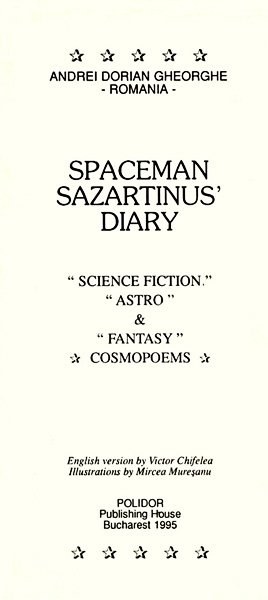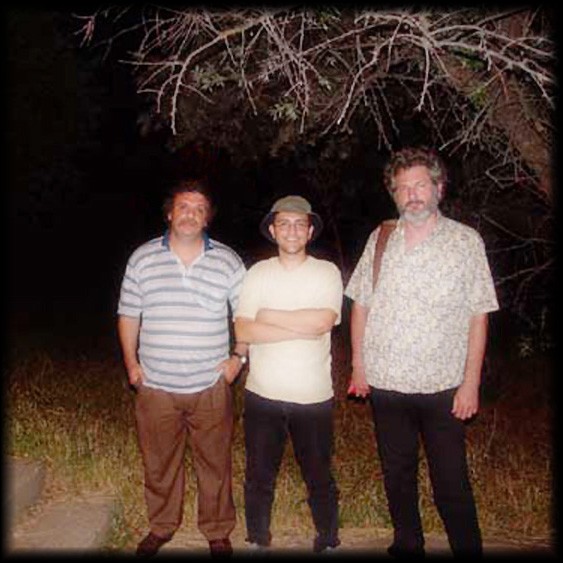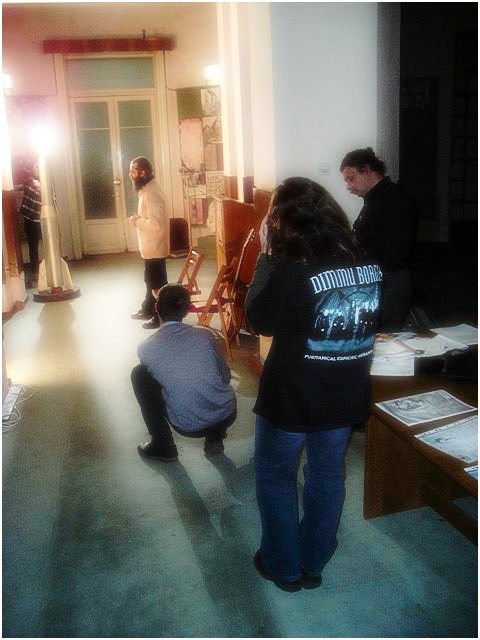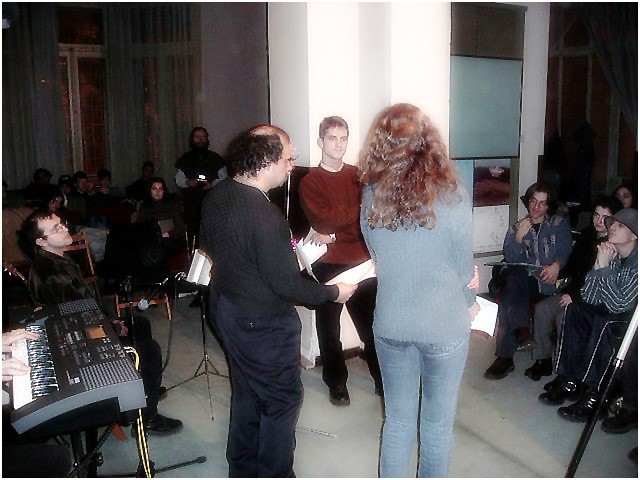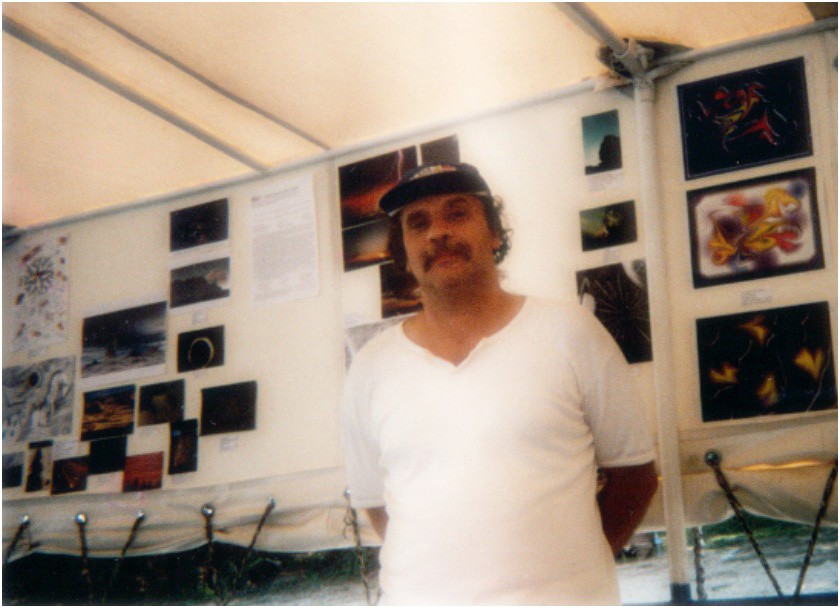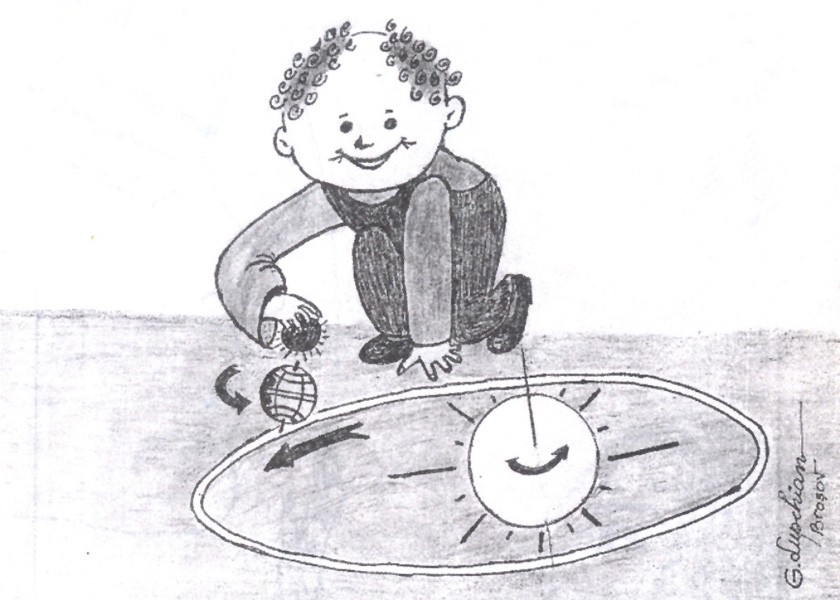 ANDREI DORIAN GHEORGHE:
SPACEMAN SAZARTINUS' DIARY ANDREI DORIAN GHEORGHE:
SPACEMAN SAZARTINUS' DIARY (first published in New Hope International Review On-Line, 1999, U.K.) -reviewer: John Francis Haines- |
|
| [Note: 1. John Francis Haines is the leader of the Eight Hand Gang (British network of Science Fiction poets) and the editor of its newsletter Handshake. 2. New Hope International Publications, open to more literary directions and especially to poetry and haiku, were founded in 1980 by Gerald England] |
|
Book Cover by Mircea Muresanu |
I quite enjoyed this. It's an oddly-sized booklet, being a bit like the kind of thing you pick up in building societies telling you their latest interest rates: tall and narrow, more or less A5 folded down the long axis. SCIENCE FICTION COSMOPOEMS takes you on a tour of the universe: On the planet Koncereiva, ASTROPOETICAL MINITREATISE is in two sections. The sons of the abysses Part two is ASTROPROVERBS: He who digs a black hole The third and final part of the booklet is called FANTASY COSMOPOEMS: If we extract the square root Terrific imagery, bizarre thoughts, quite a strong sense of the truly cosmic. |
 STARS IN THE EAST - THE ROMANIAN COSMOPOETS STARS IN THE EAST - THE ROMANIAN COSMOPOETS (first published in Star*Line - Journal of the Science Fiction Poetry Association -, 23.2, March-April 2000, U.S.A.) -by Steve Sneyd- |
|
| [Note: Steve Sneyd is a poet who leads the most important publishing house of Science Fiction poetry in Europe, Hilltop Press, and edits the Data Dump (SF/F/H/DF) newsletter. Laureate of Peterson Trophy and five-time nominated for the Rhysling Award of the Science Fiction Poetry Association, he is, at the same time, probably the most active historian in SF and speculative poetry.] |
|
| Romania, in Eastern Europe, has in recent years seen the establishment and a rapid growth of a Cosmopoetry movement, much of whose work is unarguably science fiction or science fantasy.
Romania's cosmopoets, who draw on that country's long cultural tradition of using cosmic and astronomical themes in poetry, have established an active publishing program, despite difficult economic circumstances, as well as building strong links with professional and amateur astronomers, including taking part in and performing their poetry at astronomical conferences across Europe. From the 17th century, Romanian poets used the phenomena of sky and space in their work, often drawing on ancient folktales which gave comets, meteors and so on human or creature forms and relationships. In terms of form, as well as free verse and "rhymed-and-metred", particularly popular are haiku-form, and specifically Romanian, tipuritura, two line rhymed poems, each line 7 or 8 syllables, deriving originally from Maramures folksong. The Romanian cosmopoets have a particular interest in combining poetry with other arts using astronomical themes, including providing lyrics for astromusic, from folk to electronic, texts for poetic dramas, serious and humorous, and developing combinations such as astroartpoetry and astrophotopoetry. As well as staging the National (now international) Cosmopoetry Festivals, reading astropoetry and performing poetic astrodramas etc. at a variety of events across Romania (they were particularly active during the August '99 eclipse gatherings), running competitions for young people to encourage wider involvement of a new generation in the genre, and appearing on Romanian radio's home and international broadcasts to talk about astropoetry, the group is also active internationally. Here, then, are a group of genre poets, undaunted by their country's relative isolation and poverty, who are enthusiastically determined to reach out and find new audiences, new links, for their "cosmopoetry". |
|
Andrei Dorian Gheorghe, Dan Mitrut and Calin Niculae, |
|
 ROMANIAN SOCIETY FOR METEORS AND ASTRONOMY - SARM ROMANIAN SOCIETY FOR METEORS AND ASTRONOMY - SARM (first published in Star*Line - Journal of the Science Fiction Poetry Association -, 23.3, May-June 2000, U.S.A.) -by Andrei Dorian Gheorghe- |
|
| The SARM was founded in 1993 by Valentin Grigore, and has promoted the special connection astronomy-culture-art-education-society (astropoetry being a way for popularizing astronomy and attracting people to astronomy), applied especially at the yearly event "Perseide", organized by this association. Since 1996, the SARM has founded at the "Perseide" event a yearly Cosmopoetry Festival (in 1999, the IVth edition was named the International Cosmopoetry Festival in the English language), including: recitals of antique, classical, modern and contemporary astropoetry from all over the world, contests for school pupils and youth, astropoetic drama, astrohumour, astrofolk and astroelectronic music. Also, the SARM has edited some cosmopoetry collections (supplements of the astronomical magazine "Noi si Cerul - Us and the Sky") in Romanian: -"Spaceman Sazartinus' Astropoetic Diary", -"Sazartinia Festival - Space of Cosmopoetry", -"Rasalgethi", -"Paradise of Supernovae", -"Astropoetic Magnitudes", -"Meteor Sazartinus' Letters", -"Astropoetic Drama", -"Astropoetry from Other Countries", and about 15 slim anthologies of astropoetry in English, offered at international astronomical events patronized by the International Meteor Organization, International Astronomical Union, NATO, Vatican Observatory, UNESCO, Tokyo National Observatory, and other international meetings (the European Congress of Science Fiction - Timisoara 1994, the Fair of the European Youth Organizations - Bucharest 1998, the International Education and Resource Network - Chatanooga 1998, the International Conference of the Non-Governmental Organizations - Seoul 1999). The SARM played the first three astropoetry shows at the International Meteor Organization Conferences (1997, 1998, 1999) and opened the Romanian national contemporary cosmopoetry library at the "Admiral Vasile Urseanu" Observatory - Bucharest and "Mihai Eminescu" High School - Barlad. |
|
Valentin Grigore (in the left) and Andrei Dorian Gheorghe |
|
 THE 1ST ASTROPOETRY GALA OF THE 3RD MILLENNIUM THE 1ST ASTROPOETRY GALA OF THE 3RD MILLENNIUM (a joint show of SARM-SFPA) -by Andrei Dorian Gheorghe- (first published in Star*Line - Journal of the Science Fiction Poetry Association -, 24.4, July-August 2001, U.S.A.) |
|
| There were different opinions about the beginning of the 3rd millennium, but the astronomers, almost cynically, considered this as a human convention and decided that, mathematically, the new millennium began in 2001 January 1. In this respect, the SARM (Romanian Society for Meteors and Astronomy) organized in 2001 January 27 an event that they named as "the 1st astropoetry gala of the 3rd millennium". Conceived as a "historical" event, they chose the Science Fiction Poetry Association as the main contributor-guest. In fact, it was my idea, inspired by the generous attitude of David Kopaska-Merkel (the editor of Star*Line - Author's Note) who sent us a lot of copies of Star*Line, Dream and Nightmares, Rhysling Anthology... and encouraged me to promote the SFPA image in Romania and Europe. Preparing this gala, I selected and translated into Romanian some poems or poetic fragments (on astronomical themes) composed by members of the SFPA (unfortunately, time was too short and my powers too limited for obtaining all the authors' permission, and David couldn't reply me immediately, but, being an unique moment, I assumed the risk.) After that, I arranged a SFPA exhibition including all their publications that I have, and told about this event at Radio Romania (1st program), mentioning a few important SFPA poets. (A short announcement about this gala appeared also in the most important Romanian daily, "Romanian libera".) The place of the event was the festivity room (about 70 chairs, but I think there were present almost 100 people on three hour duration) of the "Admiral Vasile Urseanu" Municipal Observatory (a temple of Romanian astronomy, built in 1910) in Bucharest, Capital of Romania. The show began with a poetic moment dedicated to the first lunar eclipse of the 3rd millennium (2001 January 9), in which I recited my own poem and a haiku suite by Gerald England (U.K.). After that, there followed an alternation of Romanian, American and British poetry, accompanied on guitar by Mihai Parlea or on a synthesizer background. Members of the SARM from all the Romanian major provinces (between 7 and 88 years old!) recited their own poems: Zigmund Tauberg, Valentin Grigore, Adrian Sima, Dominic Diamant, Constantin Dumitrescu-Cunctator, Ionut Dumitrache, Mircea Alexandru Popa, Miruna Muresanu, Emanuela Ignatoiu-Sora, Tina Visarian, Dan Mitrut, Mihai Dascalu... Teacher Ioan Adam read out verses by his students from the "Mihai Eminescu" High School of Barlad, and I read out verses by David Kopaska-Merkel, Ian Watson, W. Gregory Stewart, John Salonia, John Grey, G.O. Clark, Bruce Boston, Terry A. Garey, Sandra Lindow, Charlee Jacob, Deborah P. Kolodji, Nancy Bennet, Steve Sneyd and John Francis Haines. There was also a moment dedicated to the haiku: Iulian Olaru, Michaela Al. Orescu and Adrian Sima (all from the SARM) reciting their own creations, and I reading out astroscifaikus by Enomoto Kikaku (Japan), Sue Mill (Australia), Victoria Tarrani and Teddi Rose (U.S.A.), Kenneth Drysdale (Canada) Giovanni Malito (Ireland). We played a short astropoetic drama by Tina Visarian and I offered two copies of Star*Line (23.1) to Mircea Muresanu (a Romanian cultural personality) and Harald Alexandrescu (a Romanian personality in astronomy, who told about Urseanu Observatory history). There were also some spectacular musical moments given by Dan Mitrut (astrofolk music), and I presented some humorous moments too - letteristic jokes by Bogdan Ioana - a Romanian-Canadian engineer at Canadaair - and paradoxistic dialogues by Florentin Smarandache - a Romanian-American who founded Paradoxistic Literary Movement - and Gheorghe Niculescu. This astropoetry gala was non-profit (its costs being supported by me). We filmed it on a video tape, and I hope one day to send a copy to David Kopaska-Merkel, and another one to the Science Fiction Library (in U.K.). Perhaps those who will organize the 1st astropoetry gala of the 4th millennium will remember our joint show. Also, the best Romanian computer astro-artist, Calin Niculae, made a lot of photos. After that, the 2001 first issue (January-February) of the literary magazine of the Romanian Culture Ministry, "Universul Cartii" (The Universe of the Book), published an informative article about the SARM and SFPA joint astropoetry gala. In essence, we tried to realize at least for one evening (in this world too materialistic) an ideal inter-continental bridge of friendship dedicated to the astral poetry lovers. So, thank you for your existence, Science Fiction Poetry Association! |
|
Sequence from the 1st astropoetry gala of the 3rd millennium, |
|
 POETRY AT EUROCON 2001 - ROMANIA
-by Andrei Dorian Gheorghe- POETRY AT EUROCON 2001 - ROMANIA
-by Andrei Dorian Gheorghe- |
|
 (first published in Star*Line - Journal of the Science Fiction Poetry Association -, 25.1, January-February 2002, U.S.A.) (first published in Star*Line - Journal of the Science Fiction Poetry Association -, 25.1, January-February 2002, U.S.A.) |
|
| I know the Eurocons are usually considered poor and modest imitations in comparison with the "American" Worldcons, but in many cases they include original and valuable moments and creations which could surprise even the Americans.
In 2001 August 16-19, the first Eurocon of the 3rd millennium was hosted by Romania, in a savage isle on the Danube River (named Atlantykron and placed near the antique fortress Capidava), the traditional place of the Romanian national SF camp for the last 10 years (the discoverer of this space and the main organizer being Sorin Repanovici). The isle was full of tents and partly lightened by some phosphorescent strings. In this atmosphere, I tried to promote as much poetry as I could (with the moral support of the new leader of the Romanian National Youth Federation for Science Fiction-FNTSF, Traian Badulescu), in spite of many reservations regarding "the queen of arts" (available in Romania too) in the SF world. The great moment of the SARM was conceived for August 17 in the night. Hymn to the European Congress of Science Fiction - Capidava, Romania, August 2001 In the House of the Universe On Earth, you have parents, Don't be scared of meeting aliens Science, Fiction, Fantasy, Art. (Andrei Dorian Gheorghe) This Hymn was followed by an impressive fire of artifices lightening the whole isle and the Danube River, and after that we came back for presenting our show of astropoetic drama on Romanian electronic music, entitled Heavenly Bodies. |
|
Andrei Dorian Gheorghe next to SARM's astro-photo-art-poetry exhibition, Eurocon 2001, |
|
 (first published in Star*Line - Journal of the Science Fiction Poetry Association -, 25.3, May-June 2002, U.S.A.) (first published in Star*Line - Journal of the Science Fiction Poetry Association -, 25.3, May-June 2002, U.S.A.) |
|
| The "Heavenly Bodies" show took place at "the conference glade" (surrounded by trees), a cold breeze from the Danube River caressing the Atlantykron-Capidava isle in those moments. It included 11 Romanian electronic songs and 10 of my representative astropoems, which I recited among the musical pieces. I composed for it the following scenario: Starry Messenger (me, with my clothes and peaked cap adorned by improvised stars, a comet and a solar eclipse) directs Celestial Inventor (Giorgica Lupchian) and Daughter of the Light (Iulia Seifert Tudor, an old friend of mine, established in Germany now; she was dressed in white, with a coronet of flowers on her hair) to put the light in the Sun and to put the Earth on its orbit (in fact, Lupchian's nice invention, which had received the Silver Medal at the Geneva Fair in Switzerland). But he conflicts with Knight Void (Traian Badulescu, organizer of this show, dressed in a black mantle), who wins their first fight. Then Starry Messenger calls the heavenly bodies to parade for giving him powers: a comet and a rain of stars (through dumbshows, using décor elements and "confetti"), and other sky phenomena (through videofilms by Ilie Popescu - "SARM's astroart at the Urseanu Observatory", including photos by Valentin Grigore, photos and computer artworks by Calin Niculae -, Adrian Macinca - "Total Solar Eclipse" -, and the Germanman Sirko Molau - "Perseid meteors"). In the meantime, Knight Void abducts Daughter of the Light, so the second fight becomes decisive and more spectacular, Starry Messenger and Knight Void using two phosphorescent "swords" (given us by David Anderson, president of Time Travel Research Center - New York). Obviously, this time Starry Messenger is the winner, and after that he dances a "space waltz" with Daughter of the Light, but she leaves him for other cosmic obligations, becoming Space Morgana. The last moment is a celestial bolero, a combination between Romanian electronic music and a film (with heavenly images) by Valentin Grigore. In many respects, this first SARM show (with the support of the Planetar SF Circle-Bucharest and Romanian National Youth Federation for SF) at a SF Convention was better than what we presented in the past, at astronomical events in foreign countries. Finally, I'll replace any conclusion with the most "fantasy" of my astropoems recited at the "Romanian" Eurocon (using an English translation by Victor Chifelea): SPACE MORGANA I threw the lasso of the thought hunger Not even the alertness of the talking flames In the illusion whirl, Hypnosis? Turned to stone, (Andrei Dorian Gheorghe) |
|
Giorgica Lupchian's invention (Silver Medal at Geneva Fair) |
|
web-design/photos: calin niculae©visarta2008 |
|
